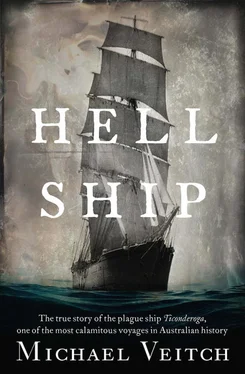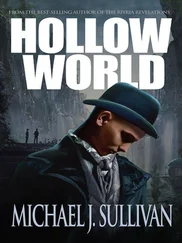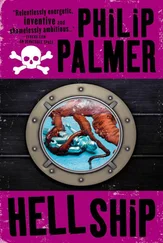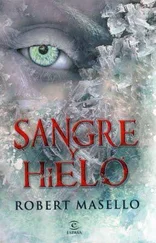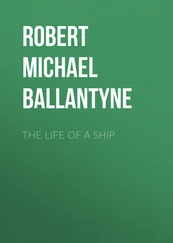Michael Veitch
HELL SHIP
The true story of the plague ship Ticonderoga , one of the most calamitous voyages in Australian history
To the boat people from every land and every era.
There is only one known image of my great-great-grandfather, Dr James William Henry Veitch. It is a classic Victorian-era portrait, taken in a Melbourne photographic studio sometime—we believe—in the late 1880s. A large man, he stands confidently in front of a canvas backdrop painted to resemble the fashionable drawing room of a home of the well-to-do. His left elbow rests against the back of a turned wooden chair, which one suspects is a little too low for comfort. Beside him, seated on a chaise longue and affecting a similar air of repose, is his wife of many years, my great-great-grandmother, Annie. She, by contrast, is small and delicate—almost bird-like.
The two had met over 30 years earlier on the ship that had brought them to Australia from England at the height of the gold rush. Annie Morrison, travelling as a single, educated assisted female emigrant, had expectations of obtaining a position such as a governess with a prosperous colonial family; James, descending from a long line of naval surgeons, and having recently secured his first contract as assistant surgeon on board a government-commissioned emigrant vessel, anticipated the beginning of a long and prestigious career at sea. Instead, what awaited them on the voyage would change and haunt them for the rest of their lives.
On an uncharacteristically sultry Liverpool day in August 1852, both of them—still in their twenties and as yet unknown to each other—had made their way up the steep timber gangway of the great black-sided ship before turning for a final glimpse of the home they were leaving behind. Only one of them, however, knew it was forever.
* * * *
Like the fragile and feverish ghosts of those who perished within the wooden tomb of the ship, their story has lingered in my family for generations. Only in his later decades could my own father bring himself to utter that strange-sounding name in anything more than a whisper: Ticonderoga. It was as if what had been seen all those years ago by the grand old man—the revered doctor, the hero ancestor, the first and most noble of our clan to bring our old Scots name to this part of the world—was too terrible to be contained within a single individual, or even a single generation.
I study Annie’s face in the photograph. In it, I see those familiar, fine-boned, pleasant features that have graced many of the women in my family. I imagine her voice soft with the burr of her native Argyllshire—she came from Tobermory on the Isle of Mull in the Western Isles of Scotland. Her dark-eyed gaze, like her husband’s, is fixed on a point a little to their right, where the man behind the camera has directed them to concentrate their attention—quite immobile—until the exposure is complete. Well over a century later, I am immensely grateful for that unknown photographer’s diligence, as there is something rather magnificent about his portrait of Dr James William Henry and Annie Veitch.
They are both dressed in their finest clothes: Annie in the formal black of a respectable Victorian lady, James wearing his woollen country gentleman’s garments with ease, his right hand thrust jauntily into a front trouser pocket. His small pair of steel-rimmed spectacles appear dwarfed by his large face, which is itself framed by a ring of white whiskers, despite his head being quite bald. His cheeks and chin are shaved smooth, revealing a fine and clear complexion (the Veitch men have always been blessed with good skin). His frame is solid but not fat, the mouth set straight and outwardly expressionless, but as I look I cannot help but detect the slightest hint of a smile.
It is his eyes, however, that intrigue me most. His gaze is strong and deliberate, but also welcoming. I am convinced—family bias aside—that I can see in that steady face a man upon whom countless others had long come to rely. Years earlier, in their desperate and dying hours, many of the wretched passengers on board his ship may well have arrived at the same conclusion about the kind and tireless Dr Veitch, and the devotion he showed to them during the single, calamitous voyage to Australia of the vessel they dubbed the ‘floating charnel house’, the ‘plague ship’, the ‘Hell Ship’: the Ticonderoga.
She was a clipper—said to be one of the most magnificent afloat. While still in port in Birkenhead, crowds from nearby Liverpool would flock across the Mersey to gaze at this four-masted beauty with her exotic name: American built, fine-lined like a thoroughbred and over a thousand tons. Her twin decks, they were told, would accommodate nearly 800 souls. Imagine that!
They would be mainly Scots, cleared ruthlessly from their ancestral homes in the Highlands, then subjected to famine and in terrible straits: many were crofters, exiled to the edges of their landlords’ estates, struggling to feed their families from tiny, unsustainable patches of soil, desperate for a better life on the other side of the world. Many of them spoke no English, others from the small villages in the glens had not so much as laid eyes upon the ocean in their entire lives. They stood by the dock, gaping at its vast expanse in wonder.
As a child, I had been told the story by my father, who in turn had been told by his, who would have heard it from Henry Veitch, the youngest son of James William Henry himself. Looking back, I seem to have come to it slowly, in fragments, and I suspect my father was disappointed in my response to this, our family’s single truly dramatic chapter.
In fact, the story of the Ticonderoga affected me deeply. One image in particular lodged itself early in my brain and has remained with me all these years. It is that of the ship’s lower deck—or rather the entrance to it. As a child, I would envisage that black hatchway plunging away from the sunlight into the dark and polluted chamber of death below. Here, in their hundreds, the passengers—men, women, infants—lay writhing in the agony and delirium of the typhus epidemic that had exploded in the dank and overcrowded bowels of the vessel, tearing through their ranks, killing over a hundred in just a few weeks and pitching many more into an illness so desperate that they would never fully recover from it. At first the dead had been buried with proper decorum at sea; however, as their numbers doubled and then trebled, they were simply hurled overboard—like ‘stiff-legged rag dolls’ as one passenger would remember it—as horrified family members looked on in shock.
As awful as this was for me, as a child, to contemplate, there was one particular detail of the passengers’ suffering I was mercifully spared: the stench. Typhus, I learned later, is a particularly grim disease. Besides the racking flu-like cough and agonising muscle spasms, the scarlet rash, the delirium and the deadly burning fever, it also savages its victims with a stink—supposedly resembling rotting flesh—so rancid that the smell of a single typhus patient can be overwhelming, even today behind the closed door of a hospital ward.
I saw (indeed, I can still see) that yawning black hole—the closest thing my young imagination could conceive to a vision of hell—opening wide to grab me, to engulf me, to suck me down into its unspeakable horror.
When, after 90 days at sea, the Ticonderoga limped to her destination and entered the heads of Port Phillip Bay, it is little wonder that those who observed her uttered the words ‘ghost ship’. Upon inspection by the authorities, her condition caused deep shock even in those hard colonial men, long inured to the dismal standards of nineteenth-century medicine. It was a fact of life at sea that people died—particularly on the long journey from Britain to Australia—but nobody had ever seen anything like what had occurred on board the Ticonderoga .
Читать дальше
